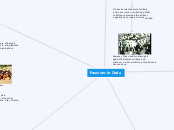Floating topic
Fascism in Italy
Indoctrination
Children were taught to respect "Il Duce,"
and chanted "Believe, Obey, Fight!" which
clearly reflected fascist ideals.
In Mussolini's schools,
children were taught fascist
ideology such as discipline, duty,
and obedience.
Mussolini believed that these values
made Rome strong.
Children also wore black uniforms,
similiar to his followers' black shirts in
the March of Rome.
Citizens were expected to follow
the motto "Mussolini is always right"
at all times.
Limited Human Rights
The Second Italo-Ethiopian War
Mussolini wanted more territory,
and a previous humiliating defeat
to Ethiopia provided the perfect
opportunity to regain honor and land.
However, they used mustard gas
against Ethiopian military and
citizens, a clear violation of the Geneva
Conventions.
Those who disagreed with the regime were
killed or exiled.
Censorship and Propoganda
Another example of
Mussolini's propaganda
that refers to him as "Il
Duce".
Mussolini also banned criticism of
the government.
Newspapers bought by fascists
wrote articles praising Mussolini,
giving him the title "Il Duce," which
means "The Leader."
Other forms of government, especially
democracy, were labelled as weak and
inferior to fascism.
When his followers seized enough power from
these events, Mussolini declared that
he would lead a "March of Rome" to defend
the capital from a communist revolution.
In reality, there was no communist revolution.
Mussolini hoped that his presence would be enough
to scare the government into giving him power.
This was an early usage of spreading false information
to suit his agenda, AKA a form of propaganda.
Throughout the 1920's, Mussolini and his followers
(dressed in black shirts) went around beating up
Socialists, Communists, and various other members
of parliament.
Legalized Police Terror
Those who criticized the party were exiled
to island prisons far away from Italy.
Mussolini's police force "Orva" was
given the power to kill those who were
suspected of being anti-fascist.
Extreme Nationalism
Benito Mussolini was originally
a socialist, but became a nationalist
during World War I.
He eventually became the fascist leader
of Italy.
He also believed that strong states had
right to conquer weaker ones. Thus, Mussolini
went on and took over Albania and the city of Fiume.
As well, military sacrifice was glorified.
This is also nationalism, as it is sacrifice
for the state.
He used reminders of Rome's
impressive past to bring Italians
together through patriotism.
Mussolini's slogan clearly
shows extreme nationalism:
"Everything in the state, nothing
outside the state,
nothing against the state."
The honor and importance
of the state was all that mattered.
Other groups also formed during this time.
Subtopic
Nationalists in Italy were displeased with
the outcome of the Paris Peace Conference
results.

